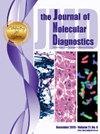High Prevalence of Chromosomal Rearrangements and LINE Retrotranspositions Detected in Formalin-Fixed, Paraffin-Embedded Colorectal Cancer Tissue
IF 3.4
3区 医学
Q1 PATHOLOGY
引用次数: 0
Abstract
Structural variants (SVs) caused by chromosomal rearrangements in common fragile sites or long interspersed nuclear element (LINE) retrotranspositions are highly prevalent in colorectal cancer. However, methodology for the targeted detection of these SVs is lacking. This article reports the use of formalin-fixed, paraffin-embedded targeted-locus capture (FFPE-TLC) sequencing as a novel technology for the targeted detection of tumor-specific SVs. Analysis of 29 FFPE colorectal tumor samples and 8 matched normal samples revealed tumor-specific SVs in 24 patients (83%), with a median of 2 SVs per patient (range, 1 to 21). A total of 104 SVs were found in the common fragile site–associated genes MACROD2, PRKN, FHIT, and WWOX in 18 patients (62%), and 39 SVs caused by three LINE transposable elements were found in 15 patients (52%). Tumor specificity of SVs was independently verified by droplet digital PCR of tumor tissue DNA, and their applicability as plasma circulating tumor DNA biomarkers was demonstrated. FFPE-TLC sequencing enabled the detection of tumor-specific SVs caused by chromosomal rearrangements and LINE retrotranspositions in FFPE tissue. Therefore, FFPE-TLC sequencing facilitates the investigation of the biological and clinical effects of SVs using FFPE material from (retrospective) cohorts of cancer patients and has potential clinical applicability in the detection of SV biomarkers in the routine molecular diagnostics setting.
在福尔马林固定石蜡包埋的结直肠癌组织中检测到高流行率的染色体重排和 LINE 逆转。
常见脆性位点(CFS)染色体重排或LINE逆转录引起的结构变异(SV)在结直肠癌(CRC)中非常普遍。然而,目前还缺乏有针对性地检测这些 SV 的方法。我们在此报告了使用福尔马林固定石蜡包埋靶向基因座捕获(FFPE-TLC)测序作为靶向检测肿瘤特异性 SV 的新技术。对 29 份 FFPE 大肠肿瘤样本和 8 份匹配的正常样本的分析显示,24 位患者(83%)存在肿瘤特异性 SV,每位患者的中位数为 2 个 SV(范围为 1-21)。在 18 名患者(62%)的 CFS 相关基因 MACROD2、PRKN、FHIT 和 WWOX 中发现了 104 个 SV,在 15 名患者(52%)中发现了由三个 LINE 转座元件引起的 39 个 SV。肿瘤组织 DNA 的液滴数字 PCR 独立验证了 SVs 的肿瘤特异性,并证明了其作为血浆循环肿瘤 DNA 生物标记物的适用性。我们的结论是,FFPE-TLC 测序能检测 FFPE 组织中由染色体重排和 LINE 逆转引起的肿瘤特异性 SV。因此,FFPE-TLC 测序有助于利用癌症患者(回顾性)队列中的 FFPE 材料研究 SV 的生物学和临床影响,并具有在常规分子诊断中检测 SV 生物标记物的潜在临床应用价值。
本文章由计算机程序翻译,如有差异,请以英文原文为准。
求助全文
约1分钟内获得全文
求助全文
来源期刊
CiteScore
8.10
自引率
2.40%
发文量
143
审稿时长
43 days
期刊介绍:
The Journal of Molecular Diagnostics, the official publication of the Association for Molecular Pathology (AMP), co-owned by the American Society for Investigative Pathology (ASIP), seeks to publish high quality original papers on scientific advances in the translation and validation of molecular discoveries in medicine into the clinical diagnostic setting, and the description and application of technological advances in the field of molecular diagnostic medicine. The editors welcome for review articles that contain: novel discoveries or clinicopathologic correlations including studies in oncology, infectious diseases, inherited diseases, predisposition to disease, clinical informatics, or the description of polymorphisms linked to disease states or normal variations; the application of diagnostic methodologies in clinical trials; or the development of new or improved molecular methods which may be applied to diagnosis or monitoring of disease or disease predisposition.

 求助内容:
求助内容: 应助结果提醒方式:
应助结果提醒方式:


